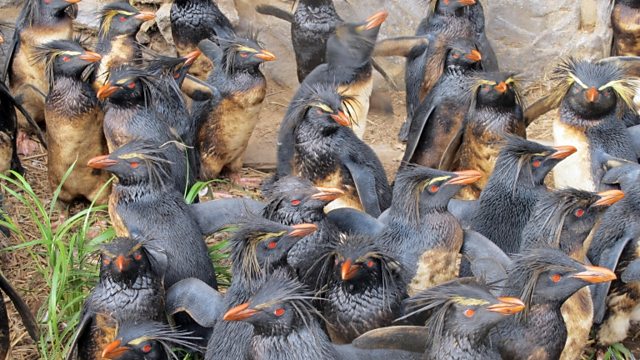25/03/2011
Oil from a crashed ship threatens the delicate ecosystem of Tristan da Cunha; Evidence that the Clovis were not the first settlers in the Americas; Applying maths to science and sport; Food tasters
Oil spill in Southern Atlantic
Two of the four islands that make up the Tristan da Cunha archipelago in the Southern Atlantic are being swamped with oil from a crashed cargo vessel. The remote islands are home to 65% of the world’s population of, the already threatened, Northern Rockhopper penguin as well as other vulnerable seabirds and island endemics. Worries about the oil are bad enough, but if rats were on the ship and they manage to swim ashore, they will cause even more destruction to the birds of these remote islands. The island economy which is based on rock lobster fisheries is also under severe threat.
Clovis First were not the first
For the past 80 years, it had been widely accepted that the Clovis people were the first humans to arrive in the New World. It was thought that around 13,000 years ago, they crossed the land bridge which is now the Bering Straight between Asia and Alaska and then spread down through the Americas. There have been rumblings of dissent with this Clovis First Theory for a few years. Now a massive haul of pre-Clovis stone tools and artefacts in Texas, dating around 3,000 years before the hunter gatherers were thought to have arrived, has really opened up the debate.
Maths in science and sport
If you ever sat in a maths class ploughing your way through differential equations thinking "What's the point? When am I ever going to use these in real life?" Well, scientists are using mathematical models more and more to predict what might happen under a given set of circumstances. Models, which are basically sets of equations, have the advantage of being non-invasive and relatively quick to run. But it can take some pretty complex maths and some massive computing power to model say, climate change scenarios, blood flow in the human body or even how an iceberg might melt.
Sports Vest
Sports medicine may well hold the key to vastly improved health care for heart patients around the world. Researchers at the University of Southern California have teamed up with the National Football League to study how wireless technology can be used to monitor the heart rates and other vital signs of players, during a game. Unlike traditional methods, the results can be seen in remotely in real time. It is hoped that using the same technology, mobile phones could be used to monitor people, in the wider population, with life threatening conditions.
Food Tasters
Supermarkets, food manufacturers and processed food is something more and more of us are relying on across the globe. As much as we may try to grow our own vegetables or rear our own chickens, the fact is many of us have come to rely on bigger organisations than ourselves to provide us with a large proportion of the pre-prepared meals we need. So how do we make sure that every meal tastes good and every dish tastes the same week in week out? People with refined palates and a great sense of taste can help, but science and technology also play an important role.
Last on
Broadcasts
- Fri 25 Mar 2011 10:32GMTΒι¶ΉΤΌΕΔ World Service Online
- Fri 25 Mar 2011 15:32GMTΒι¶ΉΤΌΕΔ World Service Online
- Sat 26 Mar 2011 01:32GMTΒι¶ΉΤΌΕΔ World Service Online
- Sun 27 Mar 2011 04:32GMTΒι¶ΉΤΌΕΔ World Service Online
- Sun 27 Mar 2011 11:32GMTΒι¶ΉΤΌΕΔ World Service Online
- Sun 27 Mar 2011 21:32GMTΒι¶ΉΤΌΕΔ World Service Online
Podcast
-
![]()
Science In Action
The Βι¶ΉΤΌΕΔ brings you all the week's science news.


